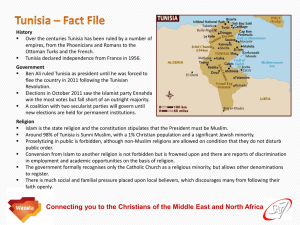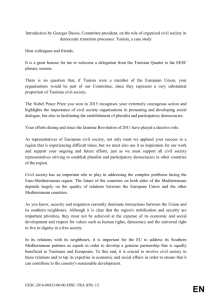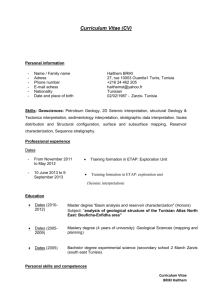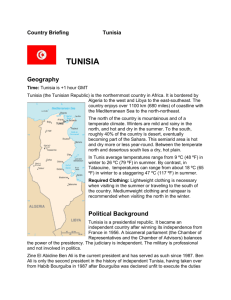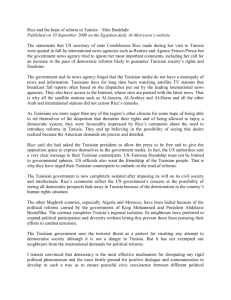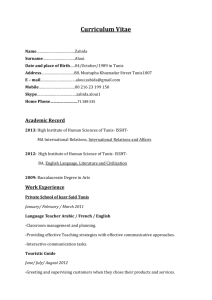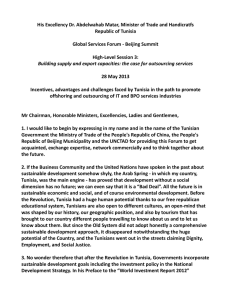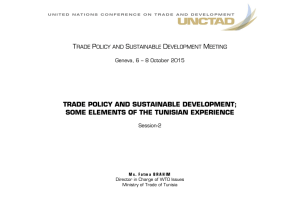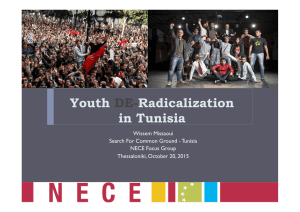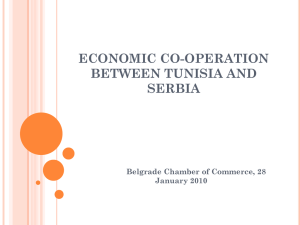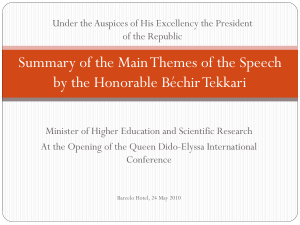Olfa Riahi`s selection of books on Tunisia today
advertisement
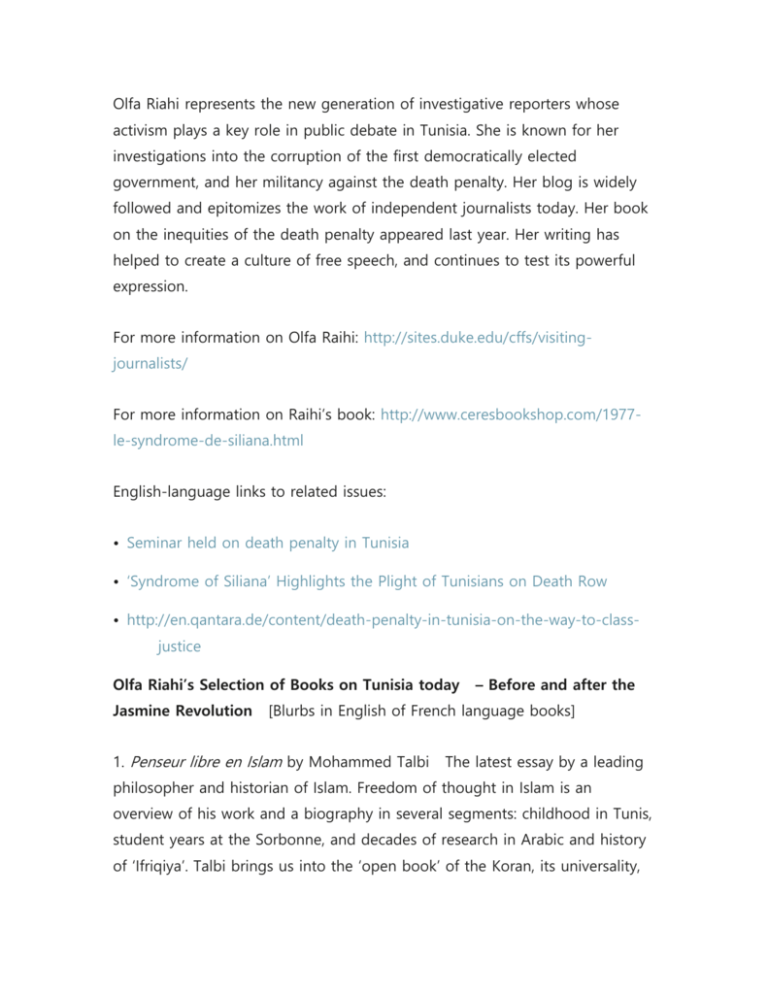
Olfa Riahi represents the new generation of investigative reporters whose activism plays a key role in public debate in Tunisia. She is known for her investigations into the corruption of the first democratically elected government, and her militancy against the death penalty. Her blog is widely followed and epitomizes the work of independent journalists today. Her book on the inequities of the death penalty appeared last year. Her writing has helped to create a culture of free speech, and continues to test its powerful expression. For more information on Olfa Raihi: http://sites.duke.edu/cffs/visitingjournalists/ For more information on Raihi’s book: http://www.ceresbookshop.com/1977le-syndrome-de-siliana.html English-language links to related issues: • Seminar held on death penalty in Tunisia • ‘Syndrome of Siliana’ Highlights the Plight of Tunisians on Death Row • http://en.qantara.de/content/death-penalty-in-tunisia-on-the-way-to-classjustice Olfa Riahi’s Selection of Books on Tunisia today – Before and after the Jasmine Revolution [Blurbs in English of French language books] 1. Penseur libre en Islam by Mohammed Talbi The latest essay by a leading philosopher and historian of Islam. Freedom of thought in Islam is an overview of his work and a biography in several segments: childhood in Tunis, student years at the Sorbonne, and decades of research in Arabic and history of ‘Ifriqiya’. Talbi brings us into the ‘open book’ of the Koran, its universality, as he considers the birth of Islam and its religious history. Talbi is a long-time participant in inter-faith dialogue, committed here to thinking Islam in relation to writings of the Christian Evangelists. http://www.ceresbookshop.com/2001-penseur-libre-en-islam.html 2. Bouazizi : une vie, une enquête by Lydia Chabert-Dalix The life of the man whose self-immolation sparked revolution in the Arab world. Neither an unemployed fruit and vegetable seller nor a university student, neither religious nor atheist, this young man shows the quandary of every young Tunisian : how to advance in the world coming from a modest background without any political connections. This journalistic investigation is more than a biography: it gives a report from Bouazizi’s hometown, Sidi Bouzid, and interviews with his family and those who knew him. http://www.ceresbookshop.com/1533-bouazizi-une-vie-une-enquete.html 3. Vous m’avez beaucoup déchu (Le meilleur de la révolution sur Facebook et Twitter) A collective anthology bringing together the principal jokes, slogans, caricatures of Tunisians working online, no longer subject to State censorship, free at last to express themselves extravagantly, and without hesitation. A social media album of revolutionary free speech. http://www.ceresbookshop.com/70-vous-m-avez-beaucoup-d%C3%A9chu.html 4. Tunisie – Fragments de Révolution The “El Kasbah” blog, born on Facebook in January 2011, became a chronicler and actor in the dramatic political events of the last three years. This book idoes more than compile the blog’s texts : it seeks to tell the story of the struggles and the debates. It reveals especially the positions of moderates that often help to grasp the emotional shock of what happened, the significance and consequences of this revolution in the Arab world. http://www.ceresbookshop.com/2211-tunisie-fragments-der%C3%A9volution.html 5. Orphelins de Bourguiba & Héritiers du Prophète by Samy Ghorbal Article 1 of the 1959 Constitution is a touchstone for Tunisian political identity: how to understand a State form of Islam? Why did Bourguiba, the voice of progress and rationality, wish to anchor modern Tunisia with religion? Why did his successor Zine El Abidine Ben Ali consort with those he wanted to combat – the islamists of Ennnahda. Where is the line of demarcation separating traditionalists and moderns? This intellectual biography of the father of Tunisian independence fields all these questions in order to consider the stakes for the Second Republic. http://www.ceresbookshop.com/1566-orphelins-de-bourguiba-et-heritiers-duprophete.html 6. Printemps de Tunis – La métamorphose de l’Histoire by Abdelwahab Meddeb In a matter of days, with the impetus of young people, a dictatorship that seemed unbudgeable, fell. Poet, essayist, and public intellectual Meddeb presents the Arab spring of Tunisia as one that inaugurates, what he calls, a metamorphosis of History. It’s a political lesson: this surge of people’s indignation destroyed theories of the end of History, as well as of the so-called clashes of civilization. A lesson in Humanity as well : the intellectual establishment was so touched by the sacrifice of a man who burnt himself alive that they could only confirm a movement launched by Tunisia’s poor and young people. http://www.ceresbookshop.com/1568printemps-de-tunis-la-m%C3%A9tamorphose-de-l-histoire.html 7. La Prochaine guerre en Tunisie by Cyril Grislain Karray Tunisia’s Next War: 5 Battles leading to Victory was written over a decade ago, and its analysis of economic, social, and educational problems is no less relevant today. It confronts the challenges that also triggered the Arab spring and the Jasmine Revolution: unemployment and the exclusion of some 2 million Tunisians. In this polemical essay, Karray, a businessman with years of experience in Brazil, and most recently public activist, offers a strategy: an economic program for Tunisia’s revitalization. http://www.ceresbookshop.com/1549-la-prochaine-guerre-en-tunisie.html 8. Habib Bourguiba Jr. Notre Histoire In this interview with Mohammed Kerrou, Habib Bourguiba Jr (1927-2009) shares the personal story and that of his country. As the son of the stateman who founded the first Tunisian Republic, he addresses his father’s political achievements and beliefs while he was President (1957-1956), as well as the role he played in the political and historical construction of Tunisia. http://www.ceresbookshop.com/2064-habib-bourguiba-jr-notre-histoire.html 9. Bonté Divine (l’homme qui n’a pas su être président) by Nizar Bahloul Director of the Business News, Nizar Bahloul takes up the office of current President Moncel Marzouki. In Divine Goodness, (the man who did not know how to be president), he explores the main issues that over the past two years have tarnished the image of Marzouki and the presidential institution. The author avoids personal accounts and rumors, focusing instead on the public record of the President that has caused controversy, inspired resentment , if not embarrassment. http://www.ceresbookshop.com/2062-bont%C3%A9-divine-l-homme-qui-n-apas-su-%C3%AAtre-pr%C3%A9sident.html 10. Penser la Société Tunisienne aujourd’hui In this work, Thinking Tunisia Today, 21 young researchers (including 19 women) focus on contemporary daily life: they explore the Tunisians’ relationship with their bodies and all the places they inhabit. They also analyze the new values and social practices in Tunisian society, as well as women’s representation in advertising, masculinity in cinema, communities and social networks, blogs and hacking. http://www.ceresbookshop.com/1901-penser-la-soci%C3%A9t%C3%A9tunisienne-aujourd-hui.html 11. Chronique d’une révolution avortée by Mehdi Kattou Basing his argument on the results of three years of lively political and social life in Tunisia, Medhi Kattou, journalist, radio and TV presenter, shares his point of view on the evolution of his country. His Chronicle of an Aborted Revolution puts the events in perspective, and in so doing the author questions the parallel between Tunisia and other countries in the region that underwent such “Revolutions.” http://www.ceresbookshop.com/2067-chronique-d-une-r%C3%A9volutionavort%C3%A9e-.html 12. Révolution ! Des années mauves à la fuite de Carthage by -Z- Signing his work with this only letter, anonymous blogger “_Z_ “ has been sharing his political texts and cartoons for 7 years on “DEBATunisie.com.” Mixing humor and anger in his satirical cartoons and articles, _Z_ follows current events in Tunisia, and notably became the first artist to publicly mock former President Ben Ali and his inner circle, “the men in purple” in 2007. http://www.ceresbookshop.com/1794-r%C3%A9volution-des-ann%C3%A9esmauves-%C3%A0-la-fuite-de-carthage.html 13. Les Tunisiens by Tahar Fazaa In this collection of chronicles illustrated by Seif Eddine Nechi, Tahar Fazaa uses humor, irony and satire to represent his vison of Tunisians, politics and daily life today. http://www.ceresbookshop.com/1886-les-tunisiens.html
